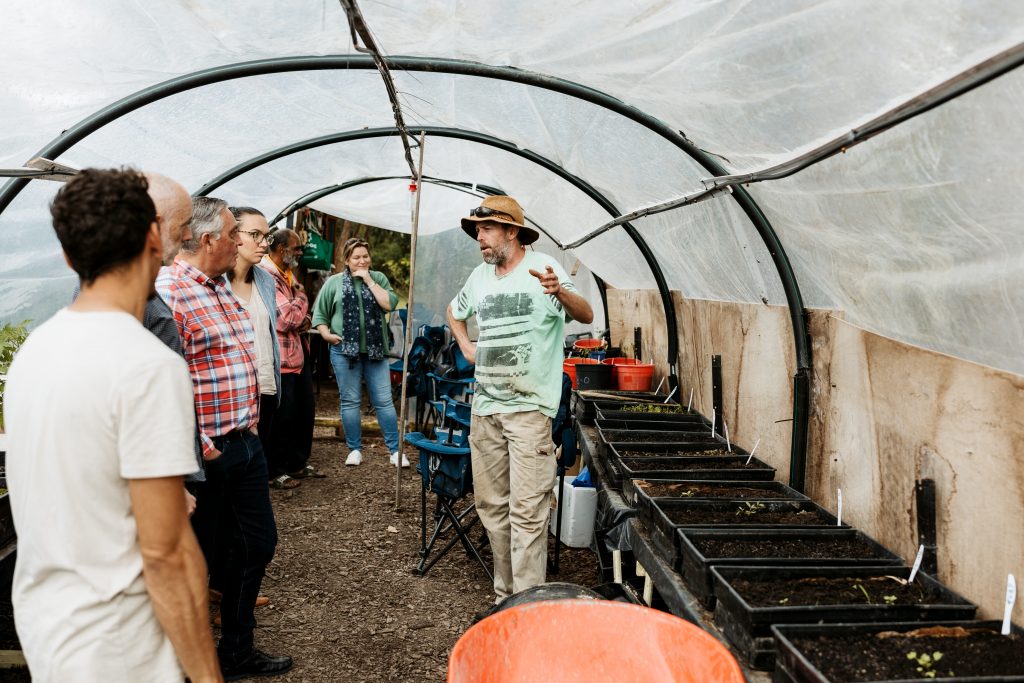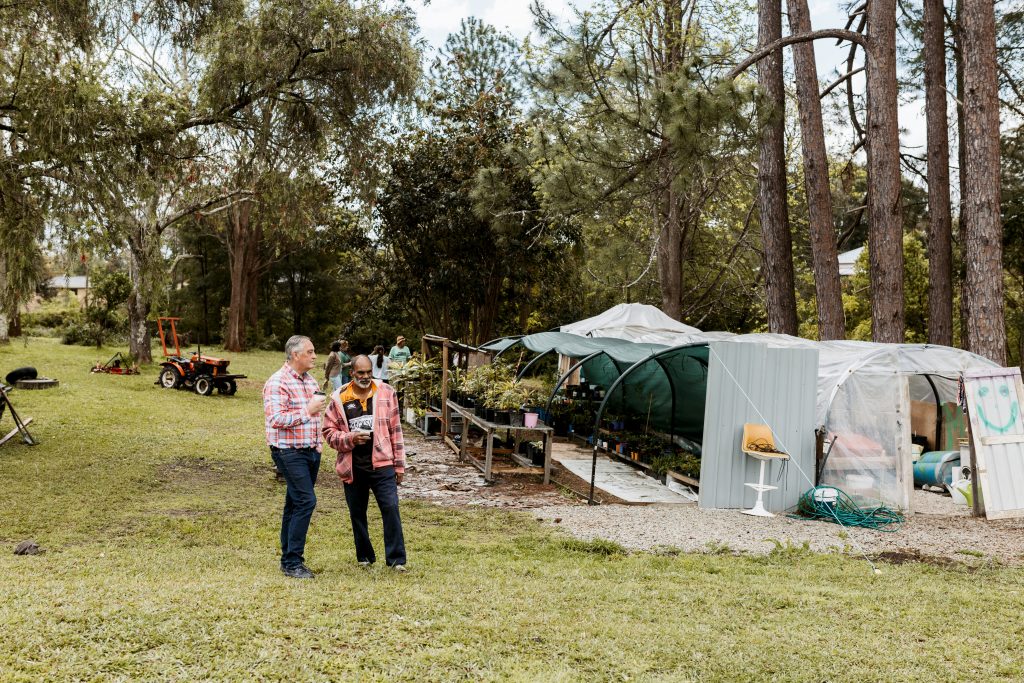Foundation for Rural & Regional Renewal (FRRR)
FRRR and VFFF today announced their partnership to expand the reach and impact of the Backing the Future program, which VFFF launched in 2022.
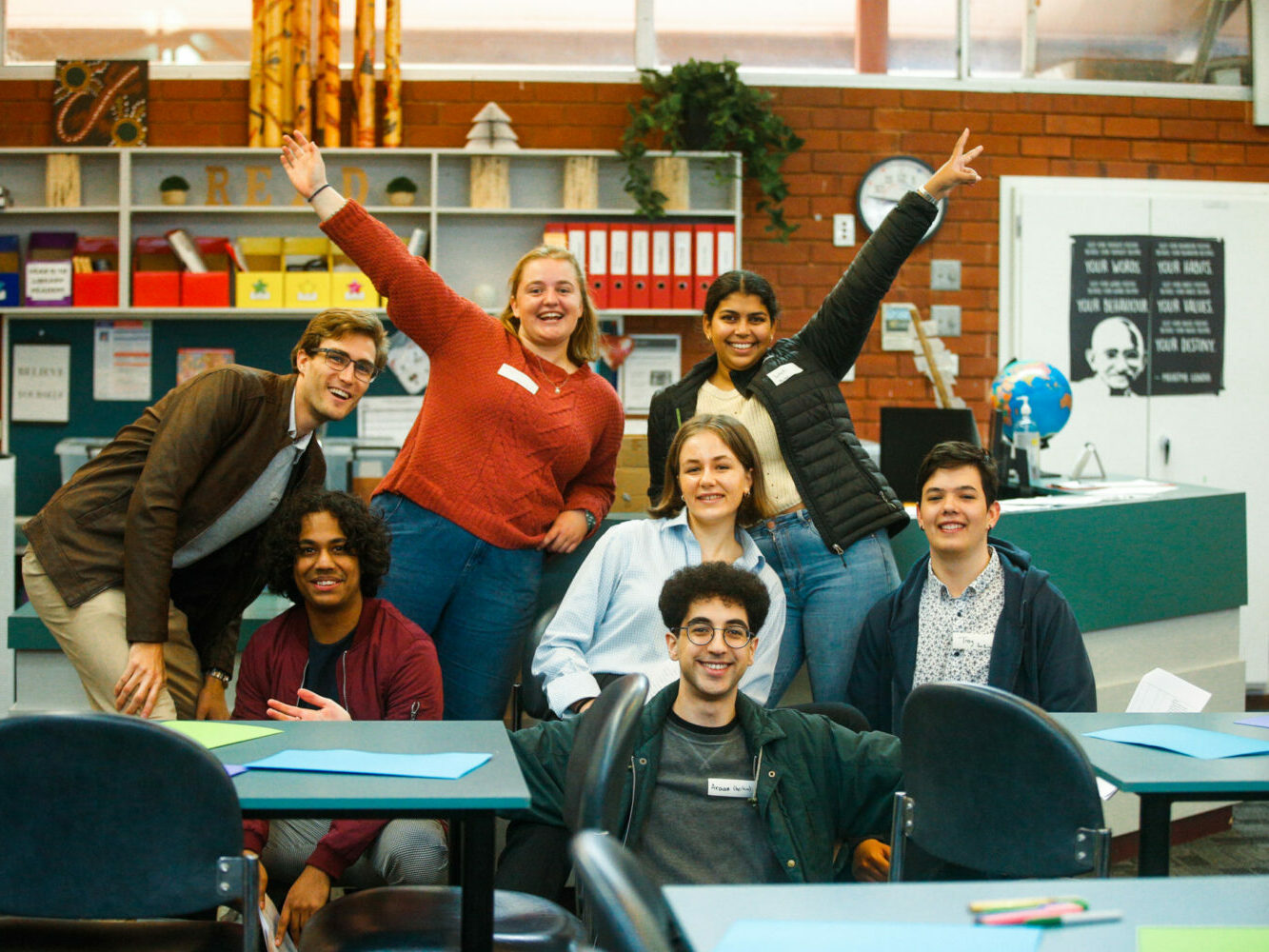
Backing the Future supports individuals and groups of individuals working to enhance the lives of people aged 12-30 who live in remote, rural and regional NSW and QLD. It offers grants of $50,000 over 12 months to support projects that align to one or more of four focus areas.
The grants are designed as seed funding for new ideas that support young people in their community. The funds can be used to assist in researching, piloting or accelerating early-stage ideas and can be used for a range of purposes such as paying a salary, purchasing technology or covering rent for office space, as long as it supports the approved initiative.
FRRR and VFFF have a history of collaborating for greater impact in remote, rural and regional communities, and are joining forces again to ensure that more young people benefit from the Backing the Future program.
VFFF CEO, Jenny Wheatley, said that by working together, the organisations know that they can enable more great ideas to come to fruition.
“VFFF established Backing the Future to provide focussed support for youth. In our first three rounds, we’ve seen some passionate people make wonderful progress on issues that matter to them and their community and which enhance the lives of young people. By partnering with FRRR, we want to extend our support into more remote, rural and regional communities.
“By working together and leveraging FRRR’s network, we hope to see more applications from more individuals who can make a difference in the lives of young people. In addition, with a larger team than VFFF, FRRR will be able to provide more support to those leading these projects, building their capacity and strengthening community for the future,” Ms Wheatley explained.
FRRR CEO, Natalie Egleton, said that the timing is great, as FRRR has recently committed to doing more to support the next generation of remote, rural and regional leaders.
“Young people want to make a difference to their communities and to the success of regional Australia, but they don’t always want to do it in the traditional ways.
“Great ideas are often hindered by funding that requires a proof of concept. In contrast, this program emphasises great ideas and the enthusiasm and energy of the individual pitching the concept. It allows them to take on leadership roles and can be a catalyst to real change.
“It’s not just open to young people though – anyone who has an idea that will benefit young people in remote, rural and regional communities can apply,” Ms Egleton explained.
A great example of how FRRR and VFFF are already having an impact on young people together, is through Backing the Future grant recipient, Jameson Harvey, founder of Red Dirt Robotics.
Red Dirt Robotics had received funding through the FRRR ABC Heywire Youth Innovation Grants to deliver two STEM workshops in remote schools. After seeing the impact of that program, Jameson used his Backing the Future grant to undertake a three-month intensive tour across rural and remote QLD teaching robotics and coding to young people.
The next round of the Backing the Future program will be for projects that benefit young people in NSW, with the grant round opening 26 July. The 2024 QLD round is currently being assessed, with the 2025 QLD round opening early next year.
A webinar will be held on 7 August, where VFFF and FRRR will share more about the program, including some case studies of the impact of past grants. Register for the webinar at: https://events.humanitix.com/backing-the-future-webinar.
In the meantime, to learn more, head to frrr.org.au/backing-the-future-by-vfff-and-frrr/ or call 1800 170 020 and speak to FRRR’s Youth Futures Manager, Lauren.
On Gumbaynggirr Country
The Nambucca Valley in NSW was one of the first participating communities in the Investing in Rural Community Futures Program, which FRRR has been running with the support of VFFF since 2019. The program aims to help local not-for-profit organisations build their capacity so that they can better support the communities they serve.
One such group is Mujaay Ganma Foundation, which was established in memory of two strong, proud Gumbaynggirr women – Mardi Walker, Mujaay and Florence Ballangarry, Ganma. The Foundation grew from the need to bring back cultural strength and trust to people and families who are dealing with cancer. But it’s grown to offer far more than that, supporting Aboriginal people and their families with culturally friendly, emotional, physical and spiritual support. Through culture and sustainable practices Mujaay Ganma also endeavours to support a healthy lifestyle in the modern Nambucca Valley.
One of Mujaay Ganma Foundation’s goals is to create the Yuraal Guunumba Ngurraay: Gumbaynggirr Native Foods Community Garden Project, which will improve the wellbeing of local Gumbaynggirr Country and community. The garden will be a space where Elders can share cultural values and pass on traditional knowledge and skills to younger generations. It will also encourage students and youth to learn about native forest and riverbank regeneration and ecosystems. There is also a plan to help young people learn the identification and properties of native plants needed for regeneration of degraded country, seed collection and propagation and nursery management skills. Ultimately, this will ensure the passing on of cultural knowledge from Elders and promote its value to the wider community. In addition, the hope is that the garden will help to connect young Gumbaynggirr people to Country, strengthen a sense of community and build the skills of local community members, leading to meaningful employment and freedom from welfare dependence, which contributes to community wellbeing. Importantly it will contribute to a healthy lifestyle, culturally, physically and collectively.
Ultimately the project aims to build the capacity of young Gumbaynggirr people, encouraging them to contribute to a more collaborative and cohesive community. This will be achieved by strengthening the passing on of cultural knowledge between Elders and the younger generations, strengthening pride in culture and in the identity of the young.
Furthermore, the wider Nambucca Valley community would have the opportunity to learn from the custodial people enabling more respectful appreciation for the original culture and abundant natural resources, so sustaining a healthy environment into the future.
However, with only being established in 2019, the organisation recognised that it needed to build its capacity before it could embark on such an ambitious project. By training local Gumbaynggirr coordinators, the project will support community leadership. These trainees could become well versed in project management and able to constructively give back to community in the future. These trainee project coordinators could learn these contemporary skills through being mentored by experienced project managers, learning how to negotiate resources, funds and engaging with other organisations by working with their mentors, learning ‘on the job’, at the same time as being supported in their culture by the custodial Elders of Country. This approach was chosen, as successful learning experiences for community people have involved learning while observing and engaging in doing.
This fit well into the priorities of the IRCF program, which included people, strategy systems and structure and sector efficiencies. They therefore applied to FRRR for a grant to enable them to hire and mentor two Gumbaynggirr people as trainees, who could then take on management of all the complex logistics involved in implementing the Yuraal Guunumba Ngurraay garden project. This was also an opportunity to help ensure that young Gumbaynggirr people are safe, connected to Country and have meaningful work.
With the support of a $38,443 FRRR IRCF grant, funded by VFFF, two trainee project coordinators were recruited and have been learning on the job. Their work has included:
- learning about workplace expectations and creating a culturally safe working environment;
- strengthening their connection to Country and culture, with Elders taking them on Country and experiencing ceremony;
- setting up systems and administrative work, including writing policies and keeping records of the planning and implementation of the many components of this complex project;
- creating a food garden under guidance of a horticultural mentor with experience working in the Aboriginal community at Miimi Aboriginal Corporation, where they learnt about garden preparation, irrigation, planting seeds and transplanting seedlings in preparation for establishing the Yuraal Garden;
- learning about caring for Country from a Traditional Custodian with land management skills; and
- managing a successful Golf and Bowls Day fundraising event, which was successful not just in raising money but in creating an event where community could come together, learn more about Mujaay Ganma Foundation and have a good healthy time together.
The training of the coordinators and the future establishment of the Garden is highly collaborative and involved several community organisations, including:
- Miimi Aboriginal Corporation, who provided continual support of resources and consultation;
- Earth Trust and Yarranbella, with support from Miimi, who mentored the trainee coordinators as they learnt to negotiate and navigate between Aboriginal and non-Aboriginal systems, between organisations and students and teachers;
- Bowraville Innovative Social Enterprise Precinct (BISEP) who helped them negotiate Western institutions and regulations;
- Muurrbay Aboriginal Language and Culture Co-operative who provided continual support of resources and consultation, in particular around language and culture;
- Gagu Land Services will took participants onto Country to help learn about caring for Country and land regeneration;
- Yarranbella Environment Services who provided the horticulturist and registered teacher, who will help develop the training package needed for the garden to be created; and
- Nambucca Valley Council who provided land for where the garden project will occur.
The Foundation was able to leverage the grant to secure wage subsidies and additional funding that meant the trainees have, with guidance, developed job descriptions, run recruitment information sessions, established a viable workplace for new recruits and learnt to supervise new staff.
Janette Blainey, Project Manager says they are proud to still be operating and to have succeeded in expanding.
“This grant we received under FRRR’s IRCF funding gave us the support and improved capacity to successfully apply for a further grant to establish a Native Seedbank and to train other young Gumbaynggirr people in custodial land management.
“While we still face challenges from the impacts of dispossession, racism and continuing colonising attitudes within the community, Mujaay Ganma Foundation has become stronger and better able to contribute more to the community. Our young trainee coordinators are growing in confidence and have pride in their culture and community, and are learning more about their culture and their Country. They are ready to step up when needed. Other young people have acquired knowledge, skills and a positive attitude to gardening an extensive food producing garden for the community to access. We also have two employees who are gaining project coordination skills. It’s also great to see improved relationships between Elders and younger community members.”
For more inspiring stories like this, head to our FY 2021/22 Annual Review.
FRRR has awarded another $286,318 in grants to four Leeton not-for-profit organisations (NFPs), in partnership with the Vincent Fairfax Family Foundation (VFFF). These grants will continue to build the capacity and sustainability of NFPs in the Leeton area, allowing them to better support their community.
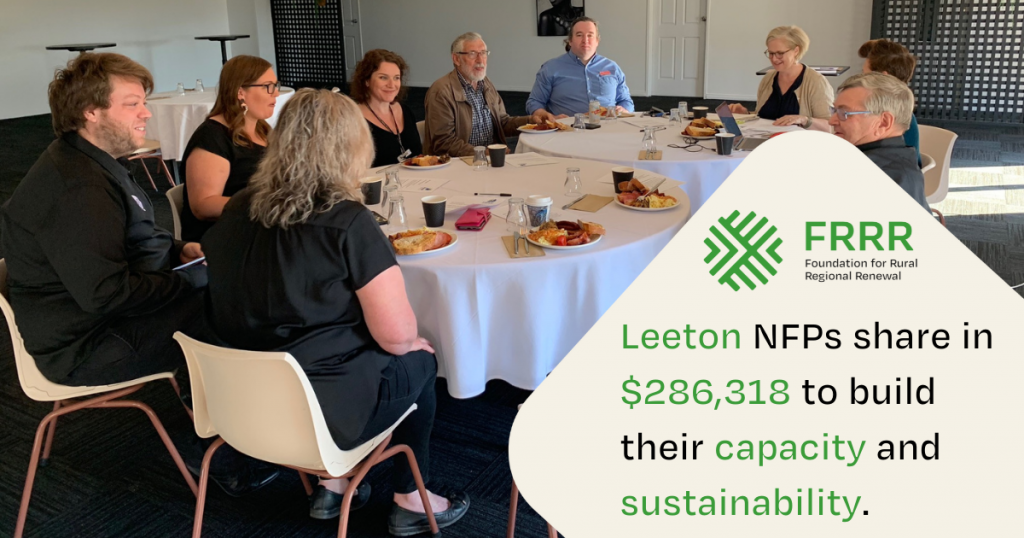
The grants are part of FRRR’s Investing in Rural Community Futures (IRCF) program – an ongoing multi-year program that works to strengthen the NFP sector and inter-organisational relationships in Leeton, helping the community to thrive and achieve long-term stability.
As part of the IRCF program, FRRR facilitated sessions with community groups to create Roadmaps to document the organisational needs that exist in the Leeton NFP community and how FRRR can support local NFPs to maximise opportunities for a stronger and sustainable NFP sector and community.
Nancy Sposato, IRCF Program Manager for Leeton, said that each of the four initiatives being funded meets a need outlined in the Leeton Roadmap.
“The applications we received confirmed what we saw in the results of the FRRR’s recent Heartbeat of Rural Australia study, which showed, overwhelmingly, that after nearly two years of constant disruptions, volunteers are fatigued. In fact, many organisations have lost their volunteers due to the impacts of COVID-19.
“This round of grants will see new and continued employment of people for Leeton NFPs, taking pressure off volunteers and allowing these organisations to continue building resilience and capacity and doing what they do best – providing vital support for their community.
“A real strength of the IRCF program is that it provides a framework for these local NFPs to collaborate and support one another while also playing to their individual strengths. We can see such a sense of community in this round of applications, with intention for almost all of the roles funded through these grant funds working from the Leeton Connect offices. This will give the broader sector much greater access to their capacity building services.
“We’re also pleased to be funding a Leeton Jumpstart Coordinator who will oversee mental health first aid training. This training will be delivered to the Leeton Jumpstart Fund assessors, as well as members of the wider NFP sector. It’s these kinds of inter-organisational initiatives that will have a widespread impact on the entire Leeton community,” said Ms Sposato.
The four funded initiatives are:
- Leeton Business Chamber – Leeton Community Digital Hub Initiative – Support the not-for-profit sector and develop, build and engage the community in a new Digital Hub for Leeton. $40,000
- Leeton Connect Inc – Leeton Continues to Connect – Build capacity of the not-for-profit sector across Leeton and develop a plan towards a secure future by continuing to employ the coordinator for Leeton Connect over a two-year period. $147,600
- Leeton Jumpstart Fund Incorporated – Leeton Jumpstart Coordinator – Build capacity in fundraising, marketing and the delivery of mental health first aid training for Jumpstart’s volunteer panel and other local NFPs dealing with crisis through the employment of a coordinator. $44,718
- Leeton Shire Council – Community Grants Support Coordinator – Help not-for-profits in Leeton apply for and strengthen their own capability to attract funding and resources by employing a Grants Support Officer. $54,000
In addition to Leeton, the IRCF program is also working in Junee and Nambucca Valley in partnership with the Vincent Fairfax Family Foundation, and in Nowra, Batemans Bay and Ulladulla with the support of The Snow Foundation, and in Bay & Basin in partnership with Bendigo Bank Community Enterprise Foundation.
For more information about the Investing in Rural Community Futures program visit – https://frrr.org.au/ircf-program/.
Nearly $700,000 in funding awarded to local community groups
Funding announced by FRRR today, is helping local community groups in Junee and Nambucca Valley to carry on their operations, despite multiple disruptions, by funding staff, developing efficient processes and boosting their capabilities through collaboration and technology.
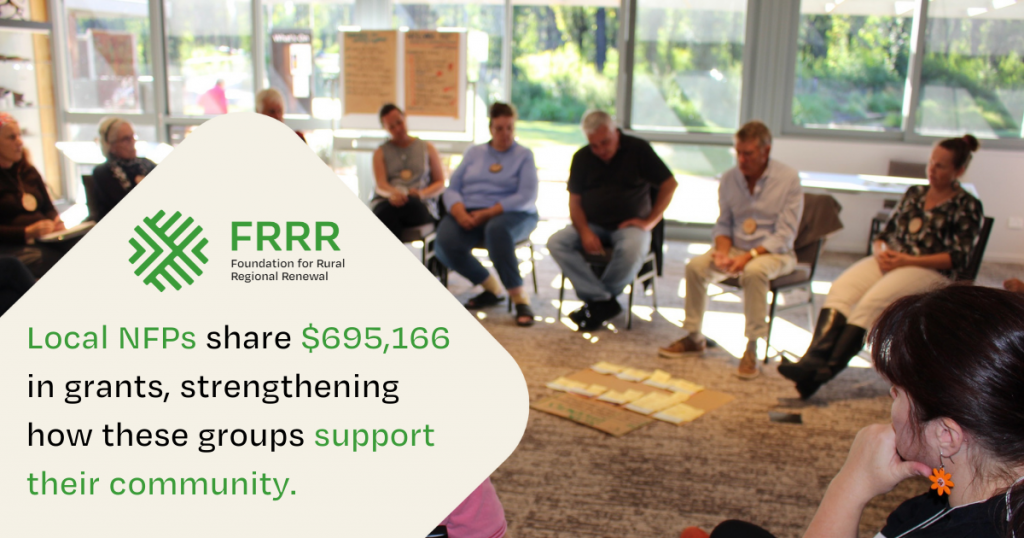
Fourteen local not-for-profits (NFPs) are sharing $695,166 in grants, which will strengthen how their organisations function, and bolster the ways in which these groups can support their communities.
Funded by FRRR, in partnership with Vincent Fairfax Family Foundation (VFFF), Investing in Rural Community Futures (IRCF) is a five-year program designed to provide local NFPs with the tools and support they need to make lasting impacts in their areas of focus for the community. As part of the program, FRRR worked with the groups to create a tailored NFP sector roadmap, reflecting their shared goals. This funding and other ongoing support, including local facilitators on the ground, is helping bring these plans to life.
Nancy Sposato, FRRR Program Manager, said that the IRCF program, now in its third year, gives participating not-for-profits the opportunity to identify common issues and develop local strategies that will support their long-term sustainability.
“Through these grants, we have supported six organisations we’ve previously funded, alongside eight new organisations. This package really shows a deeper understanding and sophistication in how organisations are approaching capacity building,” Ms Sposato explained.
“At this point in the program, it is fantastic to see collaborations and sector alliances building within each community. A great example of this is support for Unkya Local Aboriginal Land Council in the Nambucca Valley, who will deepen First Nations NFP sector collaboration and support key leaders to develop a cultural-competency induction package.
“Local employment continues to be a key capacity building measure in supporting stability and sustainability, particularly considering COVID related disruptions. For example, Junee Business and Trades will be able to employ a part-time grants officer, which will make it easier for local NFPs to apply for funding to support local projects. These grants also respond to the need for technology system and small-scale infrastructure upgrades, further enhancing organisational efficiency.
“We look forward to continuing to work with Junee and Nambucca Valley NFPs, and continuing to support them as they implement their unique roadmaps,” Ms Sposato, said.
In addition to Junee and Nambucca Valley, the rural community of Leeton is taking part in the VFFF-funded IRCF program. FRRR has also partnered with The Snow Foundation to expand the program into the Shoalhaven communities of Batemans Bay, Nowra and Ulladulla. In June, FRRR partnered with Bendigo Bank’s charitable arm, Community Enterprise Foundation to further expand the IRCF program into the Bay and Basin region.
For more information about the Investing in Rural Community Futures program visit – https://frrr.org.au/ircf-program/.
The full list of grant recipients and their projects are below.
| Organisation | Project | Grant | ||
|---|---|---|---|---|
| JUNEE | ||||
| Junee Business & Trades Incorporation | Appoint a Grants Officer Enable local Junee NFPs to access funding to support local projects through the employment of a part-time grants officer position. | $118,959 | ||
| Junee Community Centre Inc | Subsidy for Centre Manager Sustain the Junee Community Centre by subsidising the centre manager role to support organisational governance, partnerships, and strategy development. | $140,000 | ||
| Junee Community Power Inc | Junee Community Circular Fund (JCCF) Alleviate energy poverty by providing additional support to the Junee Circular Fund to facilitate completion of the installation of solar power to the Junee Senior Citizens Hall. | $47,508 | ||
| Junee Hostel for the Aged Inc | Modernise Aged Care for Junee | $49,706 | ||
| Regional Heritage Transport Assoc - Junee Inc | Moving the Junee Roundhouse Museum into the 21st Century Strengthen the capacity of the museum to operate more effectively with the installation of electronic software and appropriate hardware. | $25,724 | ||
| Riverina Working Equitation Incorporated | Illabo Showground Combined User Group Strategic Planning Enable the Illabo Showground's combined user group to develop a strategy for the future sustainability of the grounds. | $3,580 | ||
| NAMBUCCA VALLEY | ||||
| Bowraville Community Development Association Incorporated | Surveying the Bowraville NFP Community About the Future Use of the Pioneer Community Centre Strengthen the use of the Bowraville Pioneer Community Centre by surveying the Bowraville community organisations to determine future use. | $13,750 | ||
| MiiMi Aboriginal Corporation | Gumbaynggirr Receptionist | $54,470 | ||
| Mujaay Ganma Foundation Aboriginal Corporation | Yuraal Guunumba Ngurraay: Gumbaynggirr Native Foods Community Garden Project STAGE 2 Continue to foster community engagement, organisational capacity, and share cultural knowledge by engaging trainee coordinators and mentors to sustain the Mujaay Ganma's Yuraal Garden Project. | $31,173 | ||
| Nambucca Heads Mens Shed Inc | Exploring Energy Options Increase organisational capacity and save operational costs for community organisations by exploring the viability of using renewable energy to help sustain not-for-profit organisations in the Nambucca Valley. | $11,000 | ||
| Nambucca Valley Council | Local News Shared Strengthen the collaboration of the local community newsletter committees of the Nambucca Valley to build capability, share content and amplify the voice of young people across the Valley. | $43,292 | ||
| Nambucca Valley Phoenix Limited | Investing in Strategy - Building a Sustainable Social Enterprise Building a Sustainable Social Enterprise. Strengthen the capacity of the organisation to deliver on their new Strategy and aspiration to become a sustainable social enterprise by strengthening their brand and supporting staff. | $47,000 | ||
| ShoreTrack Ltd | ShoreTrack MOS (Management Operational System) Enable ShoreTrack Ltd to develop an internal operational management system to maximise the organisation’s capacity and operationalise their strategy. | $36,300 | ||
| Unkya Local Aboriginal Land Council | Jinda biin duguula (Sisters Together) To deepen First Nations NFP sector collaboration and to support key leaders to develop a cultural competency induction package. | $72,704 | ||
The search is on for a facilitator to continue to support Nambucca Valley not-for-profits (NFPs) in their ongoing development, as part of FRRR’s Investing in Rural Community Futures (IRCF) program.
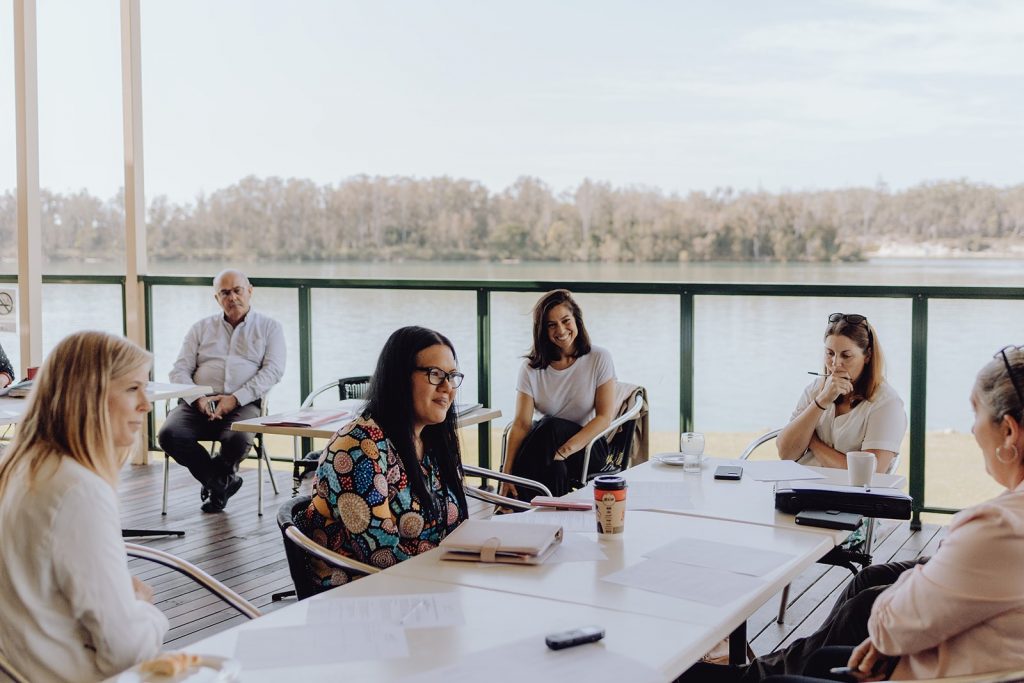
The five-year program, established by FRRR and the Vincent Fairfax Family Foundation (VFFF), involves a wide range of activities that help strengthen the capability of local NFP organisations.
Now in its third year, the IRCF program is well underway in the Nambucca Valley, as well as two other communities (Leeton and Junee), which joined the program in 2018. FRRR, supported by VFFF, is working closely with the facilitators and NFPs in each community, providing grants, coaching and other resources as the needs evolve.
Former IRCF Nambucca Valley facilitator Nancy Sposato has recently transitioned to an in-house role at FRRR, creating an opportunity for a new local leader to take her place.
Ms Sposato said the IRCF program provides great opportunities for NFPs to come together to celebrate what makes the Nambucca Valley remarkable and work together to find tailored solutions to their challenges. She encourages her fellow locals and community organisers to apply for the vacant role.
“It’s a great opportunity for a community leader to step forward and help secure a vibrant, strong and sustainable future for the Nambucca Valley community,” Ms Sposato said.
“The role allows you to walk side by side with our local community organisations to help them identify their challenges, find solutions and then support them to access the funding needed to turn ideas into action. It’s a fast-paced role that is building momentum and confidence for change in the Valley.
“Our regular NFP breakfasts bring together community leaders to collaborate on ideas as diverse as renewable energy, volunteer recruitment, governance training and new approaches to securing funding,” Ms Sposato said.
FRRR’s IRCF Program Manager, Alli Mudford, says having someone with local knowledge on the ground has been vital for the success of the program so far.
“The Nambucca Valley community values having local leaders and the traditional landowners, the Gumbaynggirr people, driving the change they recognise as priority in their own communities.
“That’s why the local facilitators are so important – they are the ones who help drive these initiatives and turn ideas into tangible solutions,” said Ms Mudford.
The facilitator role is offered on a part-time basis (20 hours per week) and is suitable for a dynamic community leader that can foster relationships and build partnerships in the Nambucca Valley community sector. It needs someone attuned to community needs and who has a deep understanding of capacity and capability building in a rural setting.
The role is a 12-month contract, with the potential to extend after that period. To apply, visit FRRR’s careers page. Applications close 5pm AEST, Friday 9 July 2021.
If you have any questions about the role or the IRCF program, contact IRCF Program Manager Alli Mudford on 0448 992 820.
Plus FRRR-supported coaching program gets underway
FRRR, in partnership with the Vincent Fairfax Family Foundation (VFFF), has awarded $276,963 in grants to four of Leeton’s not-for-profit organisations (NFPs). The funding will help these local groups build and strengthen the ways in which they are able to support the community.
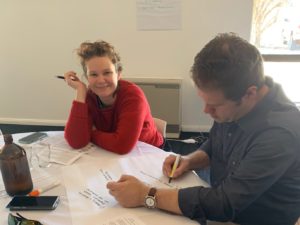
The grants are part of FRRR’s Investing in Rural Community Futures (IRCF) program – a five-year program to strengthen Leeton’s NFPs and support them to make lasting impacts in their areas of focus for the community.
As part of the program, FRRR works with the groups to roadmap their aspirations, and provides funding to help bring these plans to life.
Alli Mudford, IRCF Program Manager, said that the IRCF program, now in its second year, is helping Leeton NFPs become stronger.
“Leeton’s NFPs have been working hard to identify common issues and develop strategies that will support their long-term sustainability,” Ms Mudford said.
“These latest grants will help these local groups with much-needed resources to employ locally skilled people to support growth, organisational efficiencies and take the pressure off their amazing volunteers.
“For Western Riverina Arts, this means helping the six museums in the region to better serve the community by employing a Development Officer. Leeton Multicultural Group will also get some much-needed funding and be able to employ an Operations Manager to help support the rapid regional migration to the area. Both these projects are driven by a desire for long-term solutions, so with this in mind, the funding will be granted over three years.
“The Rotary Club of Leeton is addressing volunteer fatigue by coming up with new ways to encourage and diversify the number of local volunteers. While Leeton Community Op Shop is working to ensure their #oneleeton and #ngumbaayleeton projects are both sustainable and safety-compliant by using their grant to invest in new equipment.
“We look forward to continuing to work with Leeton NFPs, supporting them as they implement their community roadmap,” Ms Mudford explained.
Tailored NFP coaching program kicks off
As part of the IRCF program, FRRR and SEFA Partnerships have teamed up to pilot a tailored coaching program for the Leeton NFPs. The sessions will coach three groups to build skills in their local leadership teams and work on areas including effective communication, strategic planning and governance.
Leeton Arts Society, Leeton Community Op Shop and the Rotary Club of Leeton are the first three groups to be selected to participate, which begins in February.
The coaching program combines group workshops, followed by a series of tailored one on one coaching sessions with local FRRR IRCF Facilitator Claire Williams and Hannah Miller from SEFA Partnerships.
“We are pleased to be able to offer this support after such a trying 2020 and if successful we hope to expand the coaching support to others,” Ms Mudford said.
In addition to Leeton, the rural communities of Junee and Nambucca Valley are taking part in the VFFF-funded IRCF program. FRRR has also partnered with The Snow Foundation to expand the program into the Shoalhaven communities of Batemans Bay, Nowra and Ulladulla.
Ongoing Partnership Grants
|
Organisation |
Project |
Grant |
|---|---|---|
| Leeton Community Care Development Inc | #oneleeton #ngumbaayleeton Increase organisational capacity by enabling the upgrade and purchase of vital equipment to ensure compliance and sustainability of #oneleeton operations. |
$31,963 |
| Leeton Multicultural Group Inc | Organisation of the Leeton Multicultural Group Enable locally-led solutions to regional migration by building organisational strength in the Leeton Multicultural Group through the recruitment of an Operations Manager. |
$150,000* |
| Rotary Club of Leeton | Step-Up Leeton: Building Capacity from the Ground Up Respond to volunteer fatigue by building a diverse volunteer bank for the Leeton community through providing new pathways for partnerships and learning. |
$35,000 |
| Western Riverina Arts Inc | Leeton Museum Development Officer Increase the capacity of six Museums in the Leeton region by funding the employment of a Museum Development Officer to provide pathways to sustainability. |
$60,000* |
Investing in the long-term future of rural NSW communities
The Foundation for Rural & Regional Renewal (FRRR) has awarded $1,047,716 in grants to support 37 projects led by not-for-profit organisations (NFPs) across six rural communities in New South Wales, through the Investing in Rural Community Futures (IRCF) program.
The more than $1 million in grants is funded through FRRR’s partnerships with the Vincent Fairfax Family Foundation (VFFF) and The Snow Foundation, which are both committed in helping develop communities in rural and regional NSW.
IRCF is a place-based program that provides local NFPs and community sector organisations with practical support and funding so they can be stronger, more resilient, and fulfill their purpose with greater impact. The program encourages collaboration and community-led solutions that will seed the long-term self-sufficiency of these organisations.
In partnership with the Vincent Fairfax Family Foundation, FRRR launched the IRCF program in the regional NSW communities of Junee, Leeton and Nambucca Valley. Now in their second year of the five-year program, these communities are sharing a further $557,698 in Ongoing Partnership Grants.
Alli Mudford, IRCF Program Manager, said that these grants mark the start of the second phase of the IRCF program.
“The first phase was about bringing community-based organisations together to explore common needs and identify areas where they could collaborate, as well as identify what support they required as individual organisations. The kind of issues that emerged included the need for staff, organisational training and skills development, and investment in community and organisational infrastructure.
“This second phase of the program is about helping the organisations take action on these common areas of need with the support of these grants.
“For example, in Nambucca Valley, a key challenge is broad community engagement. We are supporting Nambucca Valley Youth Services and Mujaay Ganma Foundation to develop projects to help them engage more deeply with locals, particularly the young people of Nambucca Valley, by providing training and mentoring opportunities.
“In Junee and Leeton, for example, Junee Rhythm and Rail, Junee Senior Citizens and Leeton Show Society will use their funding to purchase equipment and refurbish community infrastructure that is used by a number of local not-for-profits,” said Ms Mudford.
Some of the other projects funded through these IRCF Ongoing Partnership Grants include:
- Junee Community Power received $15,000 to alleviate energy poverty for the community by installing solar power to the Junee Senior Citizens Hall. This will be the start a bigger initiative for Junee not-for-profits and community power.
- Leeton Connect received $90,000 to support Leeton not-for-profits by employing a coordinator to deliver training and development.
- Jaanymili Bawrungga in Nambucca Valley received $30,290 to develop a strategic plan to assist with operational objectives and create cultural economic sustainability with the support of a consultant.
A full list of IRCF Ongoing Partnership Grants recipients and their projects are below.
FRRR staff will continue to walk alongside these three communities, working with them to implement their community roadmap. Nambucca Valley has seen a strong demand for funding with the first tranche allocated to projects that will be managed in line with the region’s overall allocation for the life of the program. Further grants will be awarded in Leeton and Junee later in the year.
Program now rolling out on South Coast
In April 2020, FRRR and The Snow Foundation partnered with the commitment to increase their ongoing support of South Coast communities and to expand the IRCF program into Bateman’s Bay, Nowra and Ulladulla. As part of the program launch, these communities are sharing in $490,018 in Start-Up Grants.
Kate Dezarnaulds, IRCF Coordinator for Shoalhaven, said last summer’s bushfires and now COVID-19 have had a direct impact on the energy, capability, and resources of these largely volunteer-run NFPs.
“These Start-Up Grants will provide a range of dynamic grassroots organisations with funding for projects that will strengthen them and increase their capacity to support the recovery and renewal of their communities, which have been so clearly impacted by these disasters.
“For example, community organisations such as Shoalhaven Health & Arts and Milton Ulladulla Business Chamber are looking at ways to better connect with their community through improved digital infrastructure.
“Other groups, like Shoalhaven Community Preschool, Ulladulla and Districts Community Resources Centre, and the Southcoast Health and Sustainability Alliance, are using their grants to improve governance and provide tailored training and mentoring opportunities for staff and volunteers. These are the kind of projects that struggle to find funding outside of the Investing in Rural Community Futures program, but they make a real difference to the viability and resilience of the not-for-profit sector in the region,” said Ms Dezarnaulds.
Some of the other projects funded through these IRCF Start-Up Grants include:
- The Family Place in the Batemans Bay area received $40,785 to develop a 5-year strategic plan that supports the urgent need to adapt to Telehealth to continue to provide services during COVID-19.
- The Shoalhaven Women’s Resource Group in Nowra received $18,810 to work with a consultant to develop a new fundraising strategy that focuses on the launch of a social enterprise to provide a first employment opportunity for the women they support who are exiting prison.
- Treading Lightly in Ulladulla received $25,000 to establish a Community Hub to host their regular program of small-scale community building meetings, workshops and activities for the regions affiliated NFP’s – these workshops and meetings often have an environmental sustainability and youth outreach focus.
A full list of IRCF Start-Up Grants recipients and their projects are below.
Over the coming six months FRRR staff and facilitators on the ground will work closely with the three communities on the South Coast, supporting them to put their Start-Up Grants projects into action.
All 37 IRCF grantees will have until December 2021 to implement their projects.
Jump to IRCF Ongoing Partnership Grants: JUNEE | LEETON | NAMBUCCA VALLEY
Jump to IRCF Start-Up Grants: NOWRA | ULLADULLA | BATEMANS BAY

